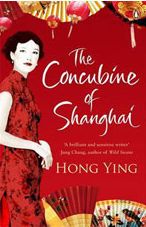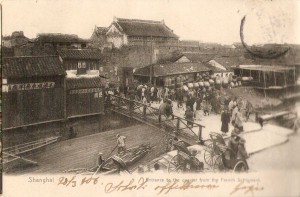 We continue travelling through Old Shanghai based contemporary literature with one of the airport bookstores favorite, Hong Ying, The Concubine of Shanghai. To be honest, Hong Ying “K: The Art of Love” is probably more famous, but the title of this one was the attraction point. Although the book have been acclaimed and makes an excellent read, I have mixed feelings about it.
We continue travelling through Old Shanghai based contemporary literature with one of the airport bookstores favorite, Hong Ying, The Concubine of Shanghai. To be honest, Hong Ying “K: The Art of Love” is probably more famous, but the title of this one was the attraction point. Although the book have been acclaimed and makes an excellent read, I have mixed feelings about it.
The original Chinese title was “上海王”, translating as “Shanghai Lord” that is probably more accurate, though surely less alluring from a marketing point of view. The main character is Cassia, a sixteen years old girl from Pudong sold to Madame Emerald, the owner of a Puxi high-class brothel located in the Chinese city, on the hedge of the French Concession. Too tall, with too big feet and curves for the fashion of the time, the girl is destined to remain a servant, when others become popular sing song girls. Her fate changes when she become the favorite girl of the leader of one of the main Shanghai secret societies. After his tragic death, Cassia falls back into poverty. She only comes back to Shanghai a few years later, leading a local opera band and rise to stardom in Shanghai. She is still involved with the underworld and manage through these connections to be one of its informal leaders.
The story of Cassia is the one of a lady struggling through life to rise to the top through her intelligence, hard work and persistence. Asia’s women are too often seen as submissive, but Cassia is a true Shanghai lady impersonating the legendary spirit and reputation of the city’s women. Although Cassia’s life in set in the 1930’s, her story and attitude reminds me of several women friend who have managed to reach excellent business positions through hard work business sense. The book is not only about business and social achievement, but also about love and sexuality. Although modest by western standard, erotic scenes are numerous in the book and Cassia’s enjoyment of sex is very clear. In a country where sex was a taboo for many centuries, it must have been quite shocking for many readers. The book is really good literature, unfortunately research on real Shanghai history is seriously lacking.

First of all, the main location of book first part is a brothel located on the border line between the Chinese city and the French Concession. There is even a scene where characters entering from the Chinese city are able to escape through the back door to the French concession. Unfortunately, at that time the real Shanghai Chinese city was surrounded by the City Wall and moated (see picture left). This was all replaced later by a large Boulevard (today Ren Min lu and Zhong Hua lu). In a similar way, a large part takes place in a hotel located next to the Garden Bridge (or WaiBaiDu Chao) that could be the Astor House hotel. The name of the hotel is surely not the right one, and at the contrary to the book state this hotel was surely not owned or run by Chinese at that time.
Some of the events in the book are also clearly picked from real people life. For example, Cassia’s poverty is caused by a parent’s death and when she has become a star she cause back to her Pudong’s origin, creating a monument for her long deceased parents and giving out charity to build a children’s school. This is strongly inspired by part of Du Yue Sheng’s life, who actually became the real Lord of Shanghai’s underworld. In another chapter, 1926 is described as the 5th year of the Republic… when it was clearly the 15th (this may be a translation mistake).
Finally, there is very little about real Old Shanghai feeling in the book. Western Old Shanghai novels like “The Master of Rain” or “Last seen in Shanghai” tend to focus on historical details while missing filling and real people’s life. At the contrary “The Concubine of Shanghai” is high on feelings and emotion, but historical research seems to have been done in 10 minutes, reading a two page leaflet for a local tour company. It is really a pity that attention to actual details (including in the translation) has been lacking so much, as it destroys most of its credit as a historical novel.
Have this book in Canterbury Tales Bookshop Pattaya, very good book